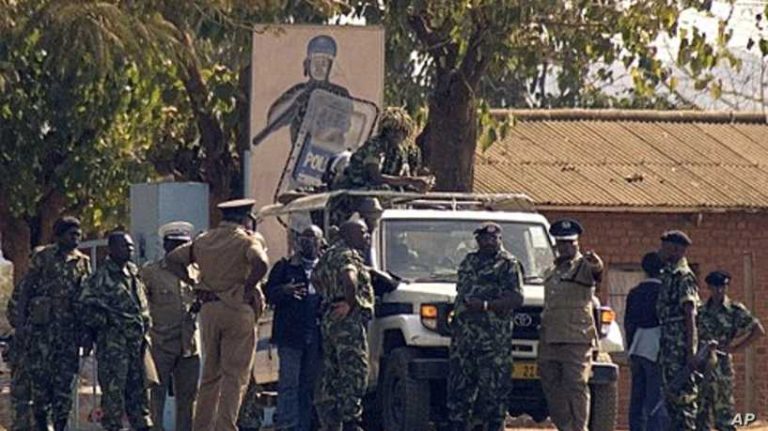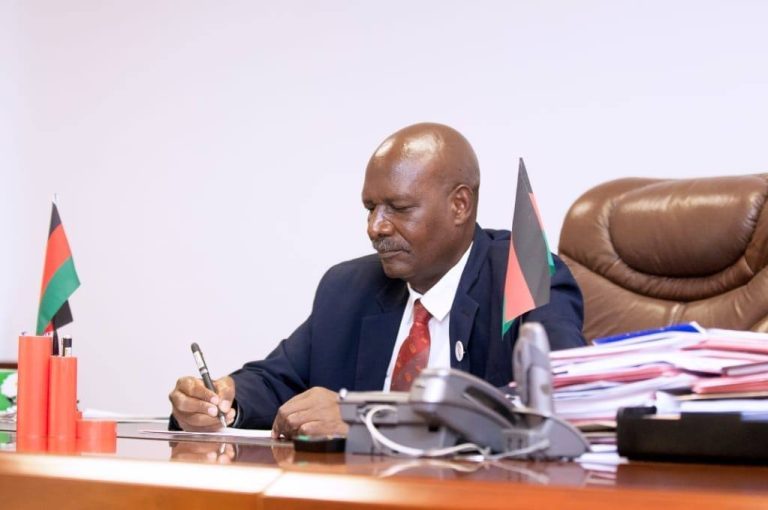BY PIJ INVESTIGATIONS
In January 2021 Inspector General George Kainja wrote Minister of Finance Felix Mlusu to submit a comparative budget between proposed lunch allowances and dry ration for officers on VVIP operations.
“Honourable Minister, previous Operation Orders have shown that one Presidential Operation draws 2,279 officers. If a minimum launch allowance of K10 000 is paid, it will cost K22, 790, 000 per operation. And if the operations per month are pegged at an average of 9, then it will cost K205, 110, 000 per month,” wrote the AG in a letter sourced by the PIJ.
He continued. “But if a dry ration is issued to the 2279 officers at K18 000 per packet, it will translate into K41, 022, 000 per operation and K369, 198,000 for the proposed 9 operations per month.”
Between the proposed allowance for individual police officers and what the government pays suppliers for food rations per packet is K8000. For the underpaid police officers, a regular stream of 10 000 allowances could have made a difference.
In a month, the government would save an estimated K164 million per month by switching to allowances.
“From the comparison above, we can conclude that the operations may cost less if lunch allowances are paid as compared to dry ration. In view of this, it is strongly proposed that a minimal lunch allowance is paid to all officers on operations at an even rate of K10 000,” Kainja submitted.
A letter Kainja wrote to Minister of Finance Felix Mlusu
The principal beneficiary of the food rations system is Zuneth Sattar, a 41-year-old Malawian-born businessman under separate but coordinated investigation in the United Kingdom and Malawi. Sattar, who also supplies military equipment such as riffles, ammunition, armoured vehicles, and water cannons, among others, supplies food rations to the police services.
In Malawi Police Service, there are two kinds of food rations: those which are imported and are commonly known as dry-ration) and locally sourced (MPS purchase rice or flour and relish from local suppliers and prepared food for officers before or during an operation).
It’s the dry rations that have proved controversial.
The food rations are deeply unpopular among police officers, and their standing has only been worsened by the spate of scandals around the food rations. A packet of food ration normally contains beef, energy chocolate, biscuits, and sweets.
Several police officers we interviewed said police officers would prefer payment of allowances to food rations.
“The food rations are bad because it’s where senior officers steal money from. On the other hand, the food rations usually overstay in the stores and as a result, they are sometimes consumed after the expiry period and are no longer as nutritious as they are supposed to be. At the moment, police officers are given a lunch allowance of K10 000 and again people don’t think that is enough,” said a police officer, speaking on condition of anonymity.
Paradoxically, despite the unpopularity of the food rations, some police officers take the food rations home and share them with their families, due to low salaries which perpetuate poverty within the police service, according to another police officer we spoke to.
In 2020, MPS’ Research and Planning Department and the Ministry of Homeland and Internal Security conducted a study which partly covered the issue of disfranchisement with food rations.
“The result showed that officers prefer allowances and locally sourced food rations to the imported ones,” national police headquarters spokesperson Peter Kalaya told PIJ.
According to Kalaya, the food rations continued however because the treasury indicated it had no money to implement the new allowance system.

“As recommended by the study, a decision was quickly made by management to stop using the imported dry rations in September 2020. However, the government, through the treasury, indicated that it did not have money readily available for this as it was within a financial year. (Note that for operations to depend on allowances and locally sourced food rations to work, we need to have funds readily available. This is different with the imported food rations, which can be supplied earlier and payment done later,” said Kalaya.
At the moment, MPS is combining both allowances and food rations depending on the nature and needs of an operation it is conducting, added Kalaya.
“There are some operations where no matter the circumstances, you cannot give money to officers because in the end security will be compromised, i.e. where officers will be required to leave their posts in search of food, or they will be deployed where food will not be available. This system is to make sure that officers are well taken care of and security is not compromised. The MPS already stopped using food rations exclusively (imported or locally sourced,” said Kalaya.
Ministry of Homeland Security spokesperson Maureen Nkhoma also confirmed that calculations have indicated food rations are expensive, and currently the Ministry is doing consultations and weighing its options.
“There is a possibility that this system may be changed,” she added.
Pulling the strings
Back in Leicester, United Kingdom, Sattar was unhappy. He wanted the contract for further food rations signed. Days prior to the recommendation to switch to food rations, NCA officials believe they recorded a conversation between Sattar and Kainja or a conversation between Sattar and a male he refers to as ‘IG’.
Sattar, a British citizen who was born in Malawi, is being investigated by the UK’s National Crime Agency and Malawi’s Anti-Corruption Bureau over the alleged looting of tens of millions of dollars from deals to supply meal kits, water cannon, and other equipment to the country’s security forces.
Sattar denies wrongdoing. He was arrested in the UK in October last year but has not been charged with any offences. The investigation was detailed in a UK court hearing in May when Sattar applied to vary bail conditions but was denied permission.
During the call, the ‘IG’ jokes about receiving a gift and that Sattar has something for him, according to the transcript of the call provided to the court.
According to the transcript, the ‘IG’ stated that there was a discussion about the charges being exorbitant, but he intimated that he had dealt with it.
“He added that “GERRY” will be putting in a request for more packs of goods a figure of 230,000 was mentioned within the conversation,” according to the transcript.
Adds the affidavit: “SATTAR mentioned payment in the new financial year and that he needed the IG’s blessing on this one and that there was 50 (believed USD 50,000) in it for him once the contract was signed. IG said he was very flexible.”
During the same call, they started to discuss potential further contracts involving the supply of boats. Still, both agreed that they needed to be careful, that “it raises eyebrows” inferring this is if the same people are involved.
Part of a transcript of Sattar’s recordings with a man believed to be Kainja
Signing off on the contract
On 23rd June, the ACB arrested IG Kainja and the lawyer for the Malawi Police Service, Mwabi Kaluwa over the food rations contracts amid suspicion that they were bribed to sign off on the contracts. The Bureau alleged that Kainja solicited an 8 000 US dollars bribe from Sattar in exchange for the food rations contract number MPS/SB/16/04/2021. The reference number of the contract suggests the contract was signed three months after Kainja himself recommended to the government to end the food rations system.
According to sources familiar with the contract, following Sattar’s intervention, the police service found a way to delay the ending of the food rations and sought legal backing for the extension of the food rations.
According to sources, through Kaluwa as legal counsel, the MPS requested a legal opinion from the then Attorney General Chikosa Silungwe on whether it could continue with the food rations or not. What prompted the legal opinion is not clear but at the time, the MPS had no running contract with any suppliers and hence could have put in effect its desired shift to the allowance system without any legal hurdles.
According to a source close to the matter, Silungwe offered a legal opinion in which he informed the Malawi Police Service that they could only start the allowance system in the 2023 financial year and not 2021.
According to officials familiar with the legal opinion, which PIJ was unable to source, the AG did not provide legal grounds on why the MPS could not start providing allowances to its officers then.
Kainja responded to our texted questions with “No response.”
The former Attorney General, the former AG, and lawyer Kaluwa were yet to respond to our questions.
Former Minister of Finance Felix Mlusu confirmed in an interview that the treasury had planned to shift to allowances, but said he could not recall the specific details of the technical arrangements.
He said he could not recall the legal opinion of the AG.
“These are matters that were handled by the former secretary to the Treasury, the plan was that going forward we should change the policy from giving them food rations to allowances,” said Mlusu, who is no longer part of the cabinet.
Silungwe refused to comment or respond to PIJ questions. “I will not respond to those questions,” he said when approached for comment.
Overpriced food rations
According to court documents sourced by the PIJ, Sattar does not manufacture the food rations but buys them, on cheap, from South Africa.
One such contract between his company, Xaviar Limited, and Serac Nutritional Products (SNP) in South Africa illustrates the arrangement.
SNP produce, supply and transport the ration packs to Malawi with Sattar’s company name on the packaging for USD8 a pack, (around 10 000 kwacha) according to findings by the National Crimes Agency of the UK.
Sattar’s company, Xaviar Limited does nothing, in the process, but charged the Malawian government USD24 a pack (around 30 000 kwacha) and Sattar claimed it was “all good business and all profit” when investigators quizzed him about the arrangement.
The theory by investigators is that this is not a mere coincidence: The real reason for the large price increase was to cover the bribes and other payments he had to make to obtain and keep the lucrative contract.
Sattar rejected this theory and claimed in an interrogation with NCA, according to court records, that the actual cost to the Malawi government was reasonable based on what the previous person was charging the government.
The previous person known to have been supplying food rations to police is Zameer Karim, who is on trial for fraud and corruption related to the same contracts. A comparison between Sattar’s contracts and Karim’s contracts show that Sattar’s contracts are also grossly expensive.
A screenshot of a contract between MPS and Zameer Karim’s Pioneer Investment.
Karim, in a contract widely considered as overpriced, was charging police services K4, 654 per pack (for 500 000 packs he was paid K2.3 billion. He would later, allegedly, fraudulently seek further payments in interest for late payment when the contract had no such clause and police had paid him in advance to service the contract and even acted as his guarantor for a bank loan (which he attempted not to repay.)
Sattar was charging around K30 000 per pack for the same products.
The food rations often come with bottled water on separate contracts, whose costs have also raised eyebrows.
In one contract which was operational around February 2020, Xelite Strips Limited, a Malawian company whose owners and directors are Sattar and his wife Tahera charges the Malawian government between £1.25 and £1.80 a bottle (around 1625 kwacha and 4212 kwacha).









